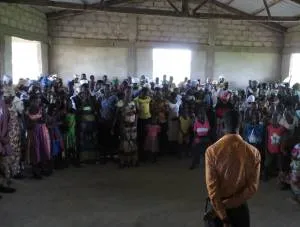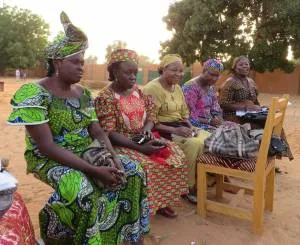There’s Much We Can Learn
A letter from Josh Heikkila serving as Regional Liaison for West Africa, based in Ghana
When American Presbyterians engage with our partners in West Africa, the first thing on some people's minds, especially for those who are new to partnership, is what we have to give our partners financially, or what we have to teach them about faith and church.
Because of the way Africa is portrayed in the West, it's an understandable approach. We see this to be a place of poverty, a place of underdevelopment, a place where the church has more recently arrived. We’re not all that aware of the great strengths and the wonderful gifts that God has given to the church and people here. But we’ll miss a lot if we don’t take the time to find out.
During my years here I’ve become convinced that when it comes to the health, vitality, and well-being of the church, especially at the congregational level, we American Presbyterians have much to receive and just as much to learn from our partners. Let me turn to Ghana for an example.

Because, historically, ordained pastors were few in number, our two partners—the Presbyterian Church of Ghana and the Evangelical Presbyterian Church, Ghana—have relied heavily on lay leadership. To this day most pastors oversee a district with four or five congregations. In some rural areas it can be up to 19 or 20 congregations!
In these congregations the pastor may come only once every few weeks to administer the Lord’s Supper. In the time in between, the preaching and worship leadership is taken up by elders and lay leaders. The Bible studies and small groups are led by church members, and they are incredibly strong.
It’s rare to meet an elder in the church who hasn’t preached on a number of occasions. In comparison, I very rarely meet an elder from the Presbyterian Church (U.S.A.) who has preached a sermon.
In the U.S. we see these things as the job of the pastor. And I’ve come to believe that looking to the pastor for everything is a major weakness for us. We don’t see sharing the Good News as something we should do ourselves—it’s the responsibility of someone else. As a result I think many of our churches are struggling.
Unfortunately, the mission relationships that we develop can sometimes perpetuate the biases we hold when we enter into them. We Americans are encouraged to see ourselves as a resourceful people with resources to give. West Africans are encouraged to see themselves as a people in need who need helping.
More and more, though, when groups come to West Africa, I encourage them to sit down with their partners for an exercise. I ask each one to take time to share what we believe are our God-given gifts and strengths. In addition, each one should share with the other their weaknesses—where they are struggling and where they need help.

It can be very difficult for American Presbyterians to articulate our weaknesses. We are embarrassed and ashamed to admit we need help. At the same time, it can be tough to get West Africans to speak about their gifts. If you see yourself as needy, you tend to overlook the great talents you actually have.
Our partners in West Africa are really doing a wonderful job with ministry among youth and young adults. The Presbyterian Church of Ghana has a vibrant group of people in their 30s and 40s, and much of the growth in the church over the past decade has been among people in this age range. We in the Presbyterian Church (U.S.A.) have so much to learn from them in this area.
Our partners are also particularly strong at encouraging their members to speak freely and openly about the way God is working in their lives. The practice of testimony is alive, and it is having a wonderful impact.
I’ve been saying for years, we in the U.S. can be wonderful evangelists—when it comes to promoting the sports team we follow, the restaurants we like, and the movies we recommend to friends. We’ll talk for hours about how yoga, or this or that diet, has transformed us. But we rarely if ever share about our faith.
I can only imagine what it would be like if we could relearn the practice of testimony. What if we would share with others how being a disciple of Jesus Christ has brought us peace? If we would share about the joy and love that we have come to experience through participation in our Christian communities?
Maybe if we could learn some of these things from our West African brothers and sisters, we would have a renewed life and vitality in our American congregations.
Again, let me thank you for the generous financial support you give which enables us to engage with our partners in West Africa. I am grateful for the way we are helping them grow, and I look forward more and more to what we are also learning from these important relationships.
Last year many of you increased your giving to respond to financial challenges World Mission was facing. Thank you for this! To avoid difficulties in the years ahead, I hope you can sustain this giving through 2016.
May God bless you.
Josh
